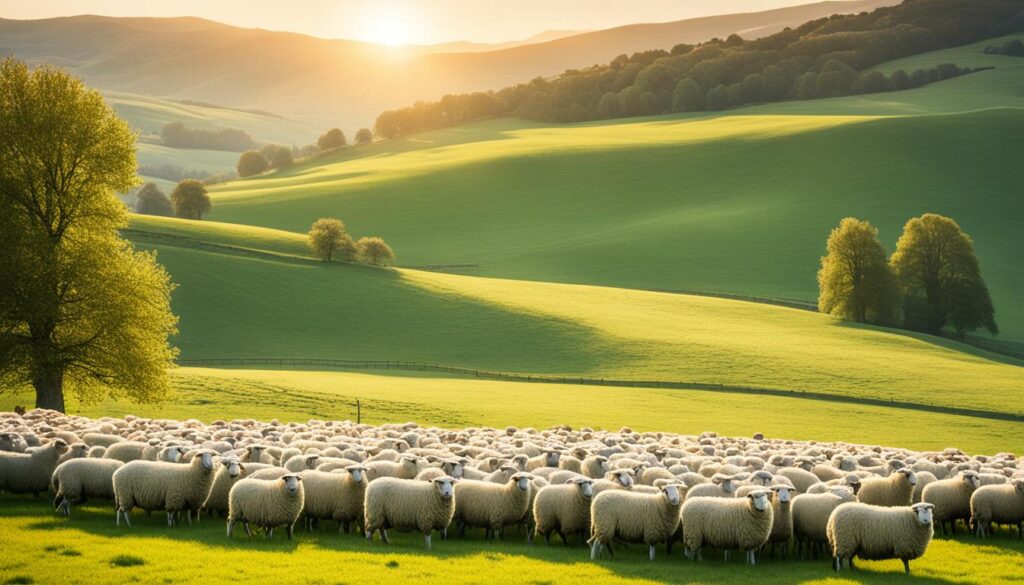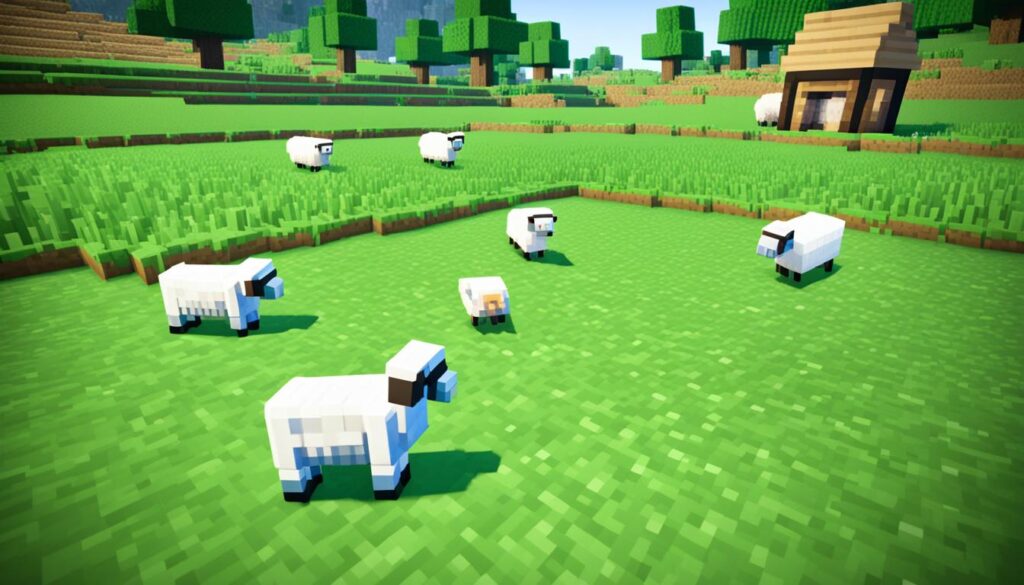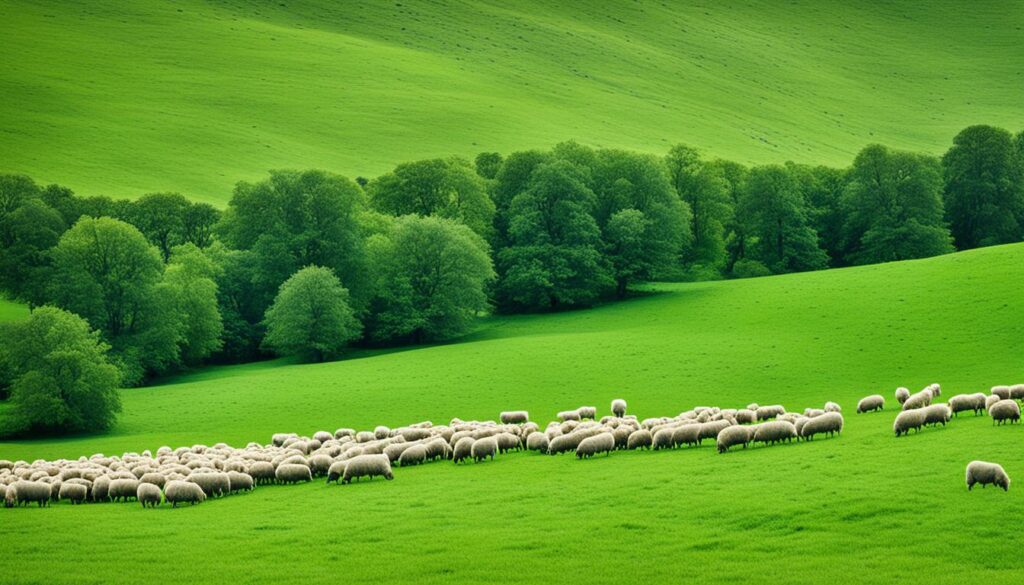Have you ever marveled at the sight of a flock of sheep grazing peacefully in a meadow? There’s something serene and timeless about their presence, isn’t there? It’s as if they carry with them a wisdom passed down through the ages, a connection to the land and the cycles of life.
When we encounter these gentle creatures, we can’t help but wonder: how long do sheep live? What is their average lifespan? And what factors influence their life expectancy?
In this article, we will embark on a journey to uncover the mysteries of the sheep lifespan. Whether you’re a farmer tending to your flock, a pet owner interested in the longevity of your wooly companion, or simply captivated by the wonder of nature, understanding the life expectancy of sheep is an endeavor that holds valuable insights for us all.
- Sheep have a remarkable connection to the cycles of life and the land they graze upon.
- Knowing the average lifespan of sheep and the factors that influence it can provide valuable insights for farmers, pet owners, and nature enthusiasts.
- In this article, we will explore the lifespan of sheep in captivity, examine the impact of genetics, nutrition, environment, and healthcare on their longevity, and debunk common misconceptions surrounding sheep lifespan.
- By understanding and implementing best practices for sheep care, we can ensure the well-being and extended lifespan of these remarkable animals.
Factors Affecting Sheep Lifespan
Various factors can impact the lifespan of sheep. Several key factors play a crucial role in determining how long a sheep can live. These factors include:
- Genetics: Genetic factors significantly influence the lifespan of sheep. Different breeds may have varying life expectancies due to their genetic makeup.
- Breed Characteristics: Each sheep breed has its own unique characteristics that can affect its lifespan. Some breeds are naturally more robust and long-lived than others.
- Nutrition: Providing a well-balanced diet is essential for the overall health and longevity of sheep. Adequate nutrition ensures that sheep have the necessary energy and nutrients to thrive.
- Environment: The environment in which sheep live can greatly impact their lifespan. Factors such as suitable housing, climate conditions, access to clean water, and ample pasture play crucial roles in sheep health and well-being.
- Overall Health: Maintaining good health and preventing diseases is vital for maximizing the lifespan of sheep. Routine veterinary care, vaccinations, and proper management practices help ensure optimal sheep health and longevity.
By considering these factors and implementing appropriate strategies, sheep owners can effectively promote the well-being and extend the lifespan of their flock.
Genetics and Breeds
When it comes to the lifespan of sheep, genetic factors play a significant role. The unique genetic makeup of different sheep breeds can influence how long they live. Let’s explore some common sheep breeds and their typical lifespans.
Romney
The Romney breed, known for its hardy nature and long staple wool, has an average lifespan of 10 to 12 years. This breed originated in England and is now found in various parts of the world, including the United States. Romney sheep are highly adaptable and can thrive in a range of environments.
Merino
The Merino breed, famous for its fine wool, has an average lifespan of 10 to 12 years. Originating from Spain, Merino sheep are now found across the globe. These highly productive sheep are known for their excellent wool quality and ability to withstand harsh conditions.
Dorset
The Dorset breed, originally from England, has an average lifespan of 8 to 10 years. Dorset sheep are known for their prolific breeding and early maturity. They are versatile and adaptable, making them suitable for various farming systems.
Suffolk
The Suffolk breed, developed in England, has an average lifespan of 8 to 10 years. These sheep are popular for their meat production capabilities and are widely used in crossbreeding programs. Suffolk sheep have a robust constitution and can thrive in different climates.
Genetics strongly influence the lifespan of sheep, with different breeds exhibiting varying life expectancies. By understanding the genetic characteristics of specific breeds, sheep owners can make informed decisions about breed selection and management practices.
To illustrate the lifespans of different sheep breeds, let’s take a look at the following table:
| Sheep Breed | Average Lifespan |
|---|---|
| Romney | 10-12 years |
| Merino | 10-12 years |
| Dorset | 8-10 years |
| Suffolk | 8-10 years |
Table: Lifespan of Different Sheep Breeds
Remember that these are average lifespans, and individual sheep may exceed or fall below these ranges. Other factors, such as nutrition, environment, and healthcare, can also influence the longevity of sheep.
Nutrition and Sheep Lifespan
A well-balanced diet is crucial for ensuring the overall health and longevity of sheep. Proper nutrition plays a significant role in their well-being and can have a profound impact on their lifespan. By understanding the nutritional requirements of sheep and providing them with a balanced diet, you can enhance their longevity and promote their overall welfare.
Sheep have specific dietary needs that should be met to support their growth, reproduction, and overall physiological functions. A nutritious diet should consist of a combination of high-quality forages, grains, and supplements to ensure that they receive the necessary nutrients.
Nutritional Requirements of Sheep
Sheep require a diet that is rich in energy, protein, vitamins, and minerals to maintain optimal health and maximize their lifespan. The specific nutritional requirements may vary depending on factors such as age, sex, breed, and reproductive status.
The main components of a sheep’s diet include:
- Forage: High-quality forage, such as pasture grass, hay, or silage, is the foundation of a sheep’s diet. It provides essential fiber, carbohydrates, and minerals that help maintain healthy digestion and promote overall well-being.
- Grains: Grains, such as corn, barley, and oats, are often included in a sheep’s diet to provide additional energy. These grains are rich in carbohydrates and can help meet the increased energy demands of pregnant or lactating ewes and growing lambs.
- Supplements: Sheep may require additional supplements to ensure they receive adequate amounts of essential minerals and vitamins. These supplements can be provided in the form of mineral blocks or feed additives specifically formulated for sheep.
The Impact of Nutrition on Sheep Longevity
“A well-nourished sheep is a healthy sheep. Providing the right nutrition is key to maximizing their lifespan and overall well-being.” – Dr. Sarah Anderson, Veterinary Nutritionist
The impact of nutrition on sheep longevity cannot be overstated. A well-balanced diet not only promotes good health and immune function but also supports proper growth and reproduction. It helps prevent nutritional deficiencies and reduces the risk of metabolic disorders and other health issues that can shorten a sheep’s lifespan.
Proper nutrition also plays a crucial role in the sheep’s ability to withstand stress and environmental challenges. Well-nourished sheep are better equipped to handle temperature fluctuations, parasite infestations, and other stressors, which can contribute to their overall longevity.
By prioritizing nutrition and providing a diet that meets their specific needs, you can significantly enhance the health, well-being, and lifespan of your sheep.
Environmental Factors
The environment plays a crucial role in determining the lifespan of sheep. Several key factors within the sheep’s habitat can significantly impact their overall well-being and longevity. Let’s explore the environmental elements that are essential for the health and longevity of sheep.
Housing
A suitable and well-maintained housing environment is vital for sheep to thrive. Proper shelter protects them from extreme weather conditions, such as harsh winds, heavy rainfall, and scorching heat. A comfortable and secure space can help reduce stress, prevent diseases, and promote overall well-being.
Climate Conditions
The climate in which sheep live can have a profound impact on their health and lifespan. Some sheep breeds are better adapted to specific climates, while others may require additional measures to protect them from adverse conditions. It’s important to understand the climate requirements of your sheep and provide appropriate care accordingly.
Access to Clean Water and Pasture
Access to clean, fresh water is essential for the overall health and well-being of sheep. Sheep should have a reliable source of uncontaminated water to stay hydrated and maintain proper bodily functions. Additionally, providing ample access to nutritious pasture allows sheep to graze freely, ensuring they receive a well-rounded diet that supports their longevity.
“The environment in which sheep live can significantly impact their lifespan, so it’s crucial to provide suitable housing, consider climate conditions, and ensure access to clean water and pasture.”
Sheep Health and Disease Prevention
Maintaining the health of your sheep is crucial for ensuring their longevity and well-being. By prioritizing disease prevention and proactive healthcare measures, you can significantly impact the lifespan of your flock.
Sheep are susceptible to various health issues, including parasites, respiratory diseases, and nutritional deficiencies. Regular monitoring and preventive measures can help mitigate these risks and promote optimal health.
Common Sheep Health Issues
Here are some common health issues that can impact sheep:
- Parasitic Infestations: Parasites like worms and ticks can cause significant health problems in sheep. Regular deworming and effective parasite control strategies are essential for preventing infestations.
- Respiratory Diseases: Pneumonia and other respiratory infections can affect sheep, especially in overcrowded or poorly ventilated environments. Good management practices, including proper housing and ventilation, can help reduce the risk of respiratory diseases.
- Nutritional Deficiencies: Inadequate nutrition can lead to various health issues, such as vitamin deficiencies, metabolic disorders, and poor growth. Providing a balanced diet and monitoring the nutritional needs of your flock is crucial for their overall health and longevity.
Proactive Healthcare Measures
To maximize the lifespan of your sheep, it is important to implement proactive healthcare measures. Some key practices to consider include:
- Vaccinations: Vaccinating against common sheep diseases can help prevent serious health issues. Consult with a veterinarian to determine the appropriate vaccination schedule for your flock.
- Regular Health Checks: Conduct routine health checks to identify any signs of illness or injury early on. This allows for timely intervention and treatment, reducing the risk of complications.
- Proper Nutrition: Ensure your sheep receive a well-balanced diet that meets their nutritional requirements. This includes providing access to fresh water, high-quality forage, and appropriate supplements if needed.
- Parasite Control: Develop a comprehensive parasite control program, including regular deworming and pasture management practices. This helps prevent parasite infestations and minimizes their impact on sheep health.
By prioritizing sheep health and investing in disease prevention strategies, you can significantly increase the lifespan of your flock. Regular veterinary care, proper nutrition, and a proactive approach to healthcare are vital for promoting their overall well-being and longevity.
Lifespan in Captivity vs. Wild Sheep
When it comes to the lifespan of sheep, there are significant differences between those living in captivity and their wild counterparts. Understanding these differences can shed light on the factors that influence sheep lifespan and have important implications for sheep owners and conservationists.
In captivity, sheep tend to have a longer lifespan compared to wild sheep. The controlled environment, regular access to food and water, and veterinary care contribute to their increased life expectancy. On average, sheep in captivity can live anywhere from 10 to 12 years, although individual lifespans may vary depending on breed and overall health.
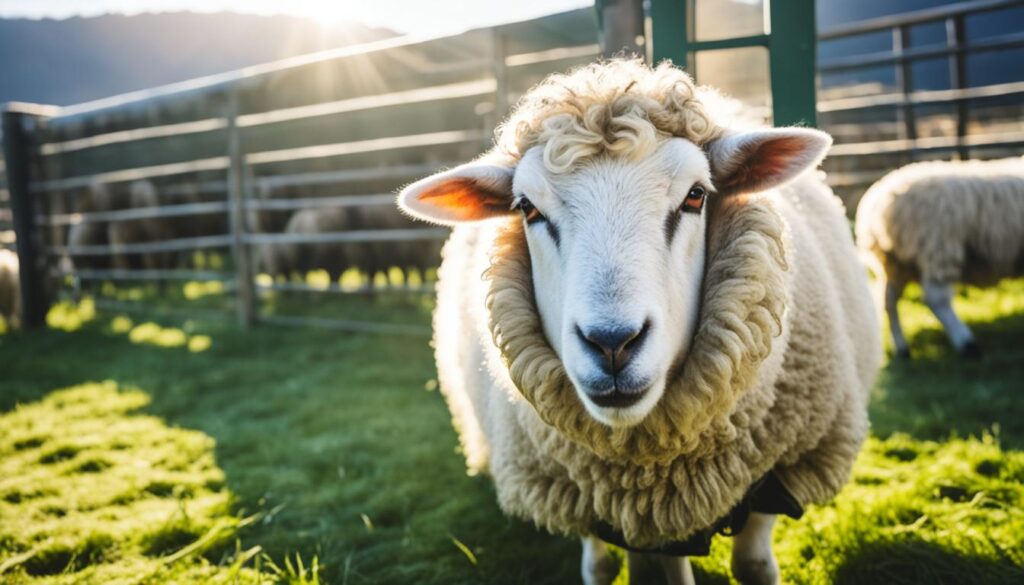
However, wild sheep face a variety of challenges that impact their lifespan. They must navigate natural predators, harsh weather conditions, and limited access to resources. As a result, the average lifespan of wild sheep is generally shorter compared to their captive counterparts, ranging from 6 to 10 years.
“In captivity, sheep can live longer due to the controlled environment and regular access to resources. Wild sheep face more challenges that can impact their lifespan, such as natural predators and limited resources.”
These differences in sheep lifespan highlight the influence of external factors on their overall longevity. For sheep owners, it emphasizes the importance of providing a suitable and nurturing environment to optimize the lifespan of their flock. Conservationists can also use this knowledge to understand the specific needs of wild sheep populations and implement strategies to ensure their survival.
Implications for Sheep Owners
For sheep owners, understanding the differences between lifespan in captivity and wild sheep can guide their management practices. It emphasizes the need for appropriate housing, adequate nutrition, regular healthcare, and predator control measures to ensure the well-being and longevity of their sheep.
Conservation Efforts
Conservationists play a crucial role in preserving and protecting wild sheep populations. The knowledge of shorter lifespans in the wild serves as a reminder of the challenges these animals face and highlights the importance of habitat preservation, predator management, and population monitoring to support their survival.
Sheep Longevity Records
In the world of sheep, some remarkable individuals have defied the odds and achieved extraordinary longevity. These sheep longevity records serve as a testament to the remarkable resilience and tenacity of these animals. Let’s take a closer look at a few of the oldest and most long-lived sheep in history.
Old Bill: The Longevity Champion
One notable record-holder is Old Bill, a Merino sheep from Australia who lived for an astonishing 23 years. Born in 1970, Old Bill surpassed the average lifespan of his breed, which is typically around 12 years. His remarkable longevity was attributed to a combination of favorable genetics, superior care, and a healthy diet.
Matilda: A Century of Life
Another sheep that achieved an impressive lifespan is Matilda, a crossbred Dorset sheep from England. Matilda holds the record for the longest-lived sheep, reaching the incredible age of 28 years. She lived a full century, from 1983 to 2011, captivating the hearts of her caretakers and the local community. Matilda’s longevity can be attributed to excellent husbandry practices and the love and care she received throughout her life.
The Secrets to Longevity
While these individual cases of extraordinary longevity are rare, they provide valuable insights into the factors that can contribute to a longer lifespan for sheep. Some key elements that may help enhance sheep longevity include:
- Optimal genetics: Certain breeds may have inherent genetic traits that promote longevity.
- Superior care and husbandry practices: Providing a well-balanced diet, regular veterinary care, and appropriate living conditions can help support a sheep’s overall health and well-being.
- Stress management: Minimizing stressors such as transportation, overcrowding, and harsh environmental conditions can contribute to a longer and healthier life for sheep.
By understanding these factors and implementing best practices, sheep owners can strive to optimize the lifespan of their flock and ensure that their animals lead long and fulfilling lives.
Enhancing Sheep Lifespan: Best Practices
By implementing certain best practices, sheep owners can help optimize the lifespan of their flock. Here are some key strategies for promoting longevity and ensuring the well-being of your sheep:
- Proper Nutrition: Providing a balanced and nutritious diet is crucial for enhancing sheep lifespan. Ensure that your sheep have access to quality grazing areas or high-quality hay and feed supplements when needed. Consult with a veterinarian or livestock nutritionist to develop a feeding plan that meets the specific nutritional requirements of your sheep.
- Regular Veterinary Care: Regular veterinary check-ups and vaccinations play a vital role in maintaining the health of your sheep. Schedule routine visits with a qualified veterinarian who specializes in sheep care. They can provide preventive treatments, identify and treat any health issues promptly, and offer guidance on parasite control and vaccination protocols.
- Stress Management: Minimizing stressors in your sheep’s environment is essential for their well-being and longevity. Sheep are sensitive animals that can become stressed easily. Ensure they have access to clean and comfortable shelters, adequate space, and a calm and quiet environment. Avoid sudden changes in their routine or flock dynamics and handle them gently to minimize stress.
Implementing these best practices can significantly contribute to enhancing sheep lifespan and the overall health of your flock. Remember to always prioritize the well-being of your sheep and seek guidance from experienced professionals to provide the best care possible.
| Best Practices | Benefits |
|---|---|
| Proper Nutrition | Provides essential nutrients for growth, reproduction, and overall health. |
| Regular Veterinary Care | Helps identify and treat health issues promptly, preventing potential complications and improving overall flock health. |
| Stress Management | Reduces the risk of stress-related illnesses and promotes a calm and comfortable environment for your sheep. |
Remember:
Implementing proper nutrition, regular veterinary care, and stress management techniques are essential to enhancing sheep lifespan and ensuring the well-being of your flock.
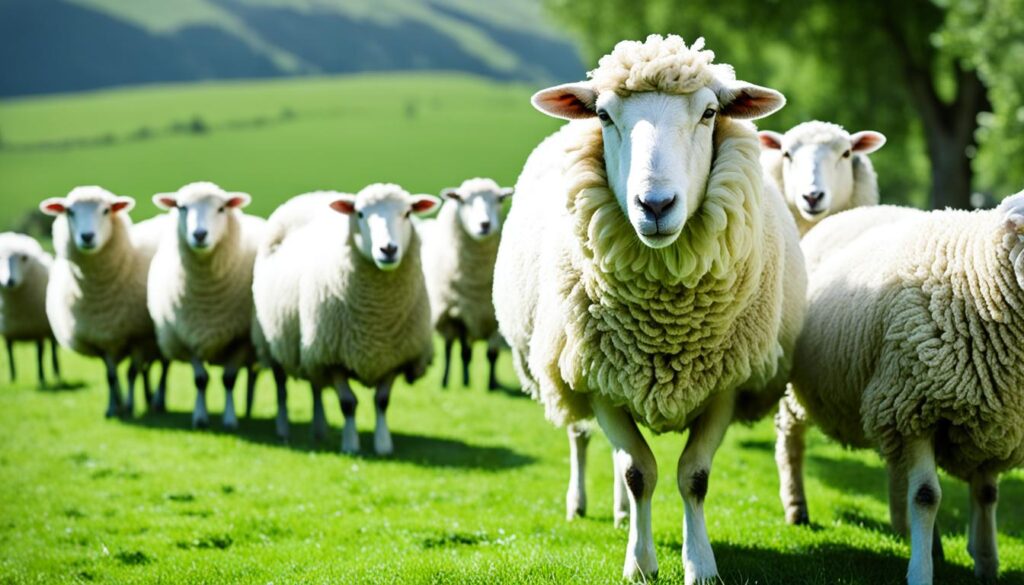
Sheep Lifespan Myths and Misconceptions
When it comes to the lifespan of sheep, there are numerous myths and misconceptions that often cloud people’s understanding. Let’s debunk some of the common misconceptions and provide accurate information based on scientific research and expert knowledge.
Myth: Sheep only live for a few years
Contrary to popular belief, sheep have the potential to live much longer than just a few years. While individual lifespans may vary, depending on various factors, including genetics and care, sheep can live well into their teens and even beyond.
Myth: Sheep age faster than other animals
Some people believe that sheep age faster than other animals, but this is not true. Sheep have a lifespan similar to many other domesticated animals and are subject to the same aging processes. Their aging is not accelerated compared to other species.
Myth: All sheep live for the same length of time
Another common misconception is that all sheep have the same lifespan, regardless of breed or individual factors. The truth is that different sheep breeds can have varying life expectancies, and even within a single breed, individual sheep can have different lifespans based on genetics, health, and care.
Myth: Sheep can't live outdoors in cold weather
While it’s important to provide suitable shelter for sheep during harsh weather conditions, they are well adapted to live outdoors throughout the year. Their thick wool provides insulation, keeping them warm even in colder climates. However, it’s essential to provide adequate shelter during extreme weather events to ensure their well-being.
“Sheep are resilient animals that have evolved to survive in various environments, including cold and snowy regions.”
Myth: Sheep don't live long in captivity
Some people believe that sheep have shorter lifespans when kept in captivity compared to their wild counterparts. However, with proper care and management, sheep can thrive and live long, healthy lives in captivity.
Myth: Sheep can't live past a certain age
There is no set age limit beyond which sheep cannot live. While it is true that sheep may be more susceptible to certain health issues as they age, with proper care and attention, they can live well beyond what some might expect.
Myth: Sheep don't need regular veterinary care
This is a dangerous misconception that can have detrimental effects on sheep health and lifespan. Just like any other animal, sheep require regular veterinary care, including vaccinations, deworming, and overall health check-ups, to prevent diseases and ensure their well-being.
By debunking these myths and clarifying misconceptions, we can gain a better understanding of sheep lifespan and provide the best care for these remarkable animals.
Conclusion
In conclusion, understanding how long sheep live and the factors that influence their lifespan is crucial for anyone involved in sheep care or those simply interested in these remarkable animals. By considering genetics, nutrition, environment, and healthcare, we can ensure the well-being and longevity of sheep in our care.
Genetic factors play a significant role in the lifespan of sheep, with different breeds having varying life expectancies. Providing a well-balanced nutrition and ensuring access to a suitable environment are also essential for promoting the longevity of sheep. Additionally, proactive healthcare measures and disease prevention play a vital role in maintaining the overall well-being and extending the lifespan of these animals.
Whether you are a farmer, a pet owner, or simply fascinated by sheep, understanding and implementing best practices can contribute to the maximization of sheep lifespan. Remember to prioritize a proper diet, regular veterinary care, and stress management for these incredible creatures, ensuring a healthier and happier life for the sheep under your care.
FAQ
How long do sheep typically live?
The average lifespan of a sheep is typically around 10 to 12 years. However, factors such as genetics, nutrition, environment, and overall health can influence their life expectancy.
What factors can affect the lifespan of sheep?
Various factors can impact the lifespan of sheep. These include genetics, breed characteristics, nutrition, environmental conditions, and overall health.
How do genetics and breeds influence the lifespan of sheep?
Genetic factors play a significant role in the lifespan of sheep. Different breeds may have varying life expectancies due to their genetic makeup. Some breeds are specifically bred for longevity.
Does nutrition affect the lifespan of sheep?
Yes, nutrition is crucial for the overall health and lifespan of sheep. A well-balanced diet that meets their nutritional requirements is essential for promoting longevity.
What environmental factors can affect the lifespan of sheep?
The environment in which sheep live can greatly influence their lifespan. Suitable housing, climate conditions, and access to clean water and pasture are important for their well-being and longevity.
How does sheep health and disease prevention impact their lifespan?
Maintaining good health and preventing diseases are essential for maximizing the lifespan of sheep. Regular veterinary care, vaccinations, and proactive healthcare measures can help extend their lives.
What are the differences in lifespan between sheep in captivity and wild sheep?
There can be significant differences in the lifespan of sheep living in captivity compared to those in the wild. Captive sheep generally have longer lifespans due to access to consistent nutrition, healthcare, and protection from predators.
Are there any records of exceptionally long-lived sheep?
Yes, throughout history, there have been remarkable cases of exceptionally long-lived sheep. Some sheep have lived well beyond the average lifespan, and factors such as genetics, nutrition, and proper care may have contributed to their longevity.
How can sheep owners enhance the lifespan of their flock?
By implementing best practices such as providing proper nutrition, regular veterinary care, stress management, and creating a suitable living environment, sheep owners can help optimize the lifespan of their flock.
What are some common misconceptions about sheep lifespan?
There are misconceptions surrounding the lifespan of sheep, such as the belief that all sheep live for the same duration or that they have short lifespans. It’s important to rely on accurate information based on scientific research and expert knowledge.

